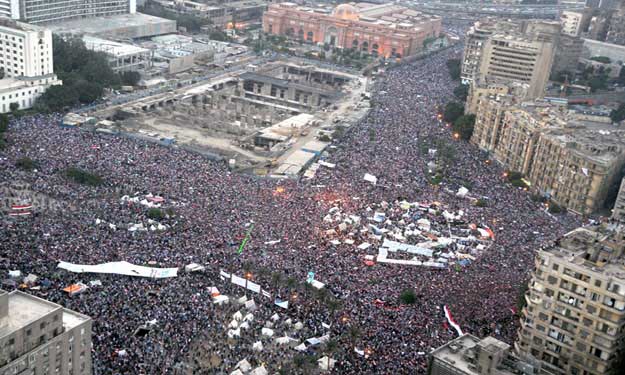 Bahey eldin Hassan, the director of the Cairo Institute for Human Rights Studies, met with Dr. Iskandar Ghattas, the vice-president of the national independent fact-finding commission, yesterday at the commission’s headquarters in a 75-minute meeting, to discuss ways to support the mission of the commission.
Bahey eldin Hassan, the director of the Cairo Institute for Human Rights Studies, met with Dr. Iskandar Ghattas, the vice-president of the national independent fact-finding commission, yesterday at the commission’s headquarters in a 75-minute meeting, to discuss ways to support the mission of the commission.
Hassan noted that the commission was engaged in a vital historical mission: either it could compensate for the ongoing inability of the Egyptian judicial system to hold accountable those responsible for massacres and human rights crimes over the last three years, thus restoring the faith of Egyptians and the world in the Egyptian judiciary, or it could fail and leave the task to the international courts. Hassan added that the Egyptian judiciary has thus far failed due to the lack of political will on the part of every person who had governed Egypt over the last three years.
Hassan added that completing its mission requires all relevant state bodies and institutions to provide all necessary support to the commission. Moreover, the commission should seek technical support from the UN to enable it to do its job well—aid that the UN would not hesitate to offer if asked.
Hassan explained that the president could provided crucial moral support to the commission at this difficult time by ordering the immediate publication of the full text of the reports of the previous two fact-finding commissions formed under the rule of the Supreme Council of the Armed Forces and the Muslim Brotherhood. The president should also ask the Supreme Judicial Council to refer the two reports to investigating judges known for their independence. Such steps would shore up the commission’s self-confidence and show the public that its efforts will not meet the fate of those of the two earlier commissions, whose reports were quickly shelved, thus closing the door to justice for the victims. It would also boost the public’s confidence in the new commission and limit the tendency by some victims and their families to take the law into their own hands with violence due to the lack of justice.
If the president publicly committed to bringing the perpetrators of human rights crimes committed after June 30 to justice, it would help to curb the cycle of violence that grows worse by the day. In this context, Hassan suggested that the commission draft a bill to forward to the president that would protect witnesses that testified before the commission. He also proposed that the commission look closely at the similar experiences of South Africa and some Latin American countries and to meet with independent human rights organizations to explore possible avenues of cooperation.
Hassan suggested that the commission take the initiative to regularly inform the public of its work and the challenges it faces and that it affirm in its first statement that it is committed to investigating every incident that constitutes a violation of Egypt’s international commitments under international human rights conventions ratified by Egypt. It should also commit to releasing the text of its full report to the public.
Hassan said that that the commission must clearly lay out the scope of its work, including an analysis of the political context for human rights crimes. The commission must enjoy the undisputed authority to access evidence and information from all government and security bodies, officials, and individuals and relevant files and documents, as well as the right to summon any person, undertake pertinent searches, and meet witnesses in full secrecy without interference or harassment.
Hassan suggested that the commission offer recommendations for constitutional and legislative reforms it deems necessary, based on its findings, to prevent the reoccurrence of the crimes it investigates.
Share this Post

